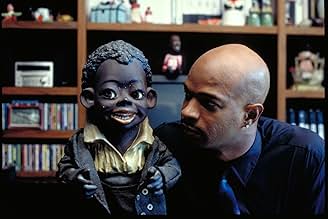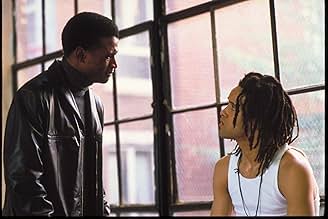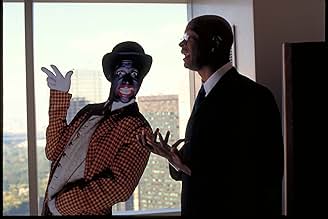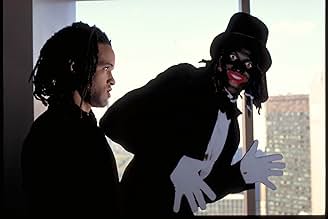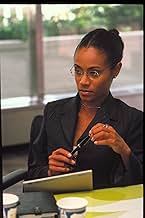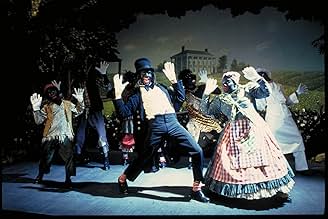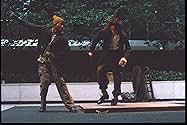IMDb RATING
6.7/10
13K
YOUR RATING
A frustrated African-American TV writer proposes a blackface minstrel show in protest, but to his chagrin, it becomes a hit.A frustrated African-American TV writer proposes a blackface minstrel show in protest, but to his chagrin, it becomes a hit.A frustrated African-American TV writer proposes a blackface minstrel show in protest, but to his chagrin, it becomes a hit.
- Awards
- 2 wins & 10 nominations total
Jada Pinkett Smith
- Sloan Hopkins
- (as Jada Pinkett-Smith)
Gillian White
- Verna
- (as Gillian Iliana Waters)
Yasiin Bey
- Big Blak Afrika
- (as Mos Def)
M.C. Serch
- Mau Mau: 1-16th Blak
- (as MC Serch)
Craig muMs Grant
- Mau Mau: Hard Blak
- (as Mums)
Dormeshia Sumbry
- Pickaninny: Topsy
- (as Dormeshia Sumbry-Edwards)
- Director
- Writer
- All cast & crew
- Production, box office & more at IMDbPro
Featured reviews
I want to like Spike Lee. He's an important film-maker whose work refuses to let us forget our past or ignore the present it's created. His career has been devoted to asking questions no one wants to answer, and such courage rare in Hollywood - is something to value. What frustrates me is that his films rarely live up to the ideas behind them, and Bamboozled is no exception.
It presents his most interesting idea and biggest disappointment to date. Harvard-educated screenwriter Pierre Delacroix (Damon Wayans) is frustrated. The sole black writer at his network, his ideas for shows featuring the black middle class are rejected one after the other. His white station manager wants something more real real meaning poor, undereducated and armed, the kind of `real' we see in gangsta rap videos. In reply, Delacroix creates The New Millennium Minstrel Show, a black-face variety show that will fail so badly and outrage so many he'll be freed from his contract. Hosted by Mantan and Sleep n' Eat, the show is set in a plantations watermelon patch, filled with sketches where the duo steal chickens from their overseer's coop. The pilot is a hit and suddenly Delacroix finds his creation out of his control.
Bamboozled was a hard film to finance and its struggle points to its importance, but despite its wealth of ideas the execution is poor and reeks of an opportunity missed. Much of its failure comes from the central performance by Wayans, a frankly bizarre turn that irritates from the first word. His Delacroix, uncomfortable in his skin, has changed his name and much of his accent. What remains is an impression of an upper-class white man which is just that an impression. It's a superficial performance, a pantomime out of place among the more subtle performances that surround it. I appreciate its point, that Delacroix is ashamed of his origins, but it misses the target and does nothing but grate.
Beyond that, Bamboozled is underwritten and feels under-rehearsed. The character development is sloppy, huge changes in personality coming without warning and with little credibility. Add to that a clichéd friendship-not-surviving-success subplot and big ideas apparently lifted from The Producers and Network, and there seems little left to praise.
But while it fails on many levels, the good ideas remain and allow Lee to explore two main themes the past degradation of black performers and the position they hold today. We learn that black artists in minstrel shows or movies had little choice but to degrade themselves if they wished to pursue a career in entertainment. They were only allowed to be greedy, lazy, bug-eyed buffoons, stripped of their dignity so white audiences could enjoy them without addressing their prejudices. Willie Best, an actor from the 1930s who himself performed under the name Sleep n' Eat once asked 'What's an actor going to do? Either you do it or get out."
Addressing the status of today's black performers in a number of interviews, Lee has accused gangsta rap of being `the 21st century minstrel show'. It's an interesting argument, seeing that its lyrics and videos give overwhelmingly negative images of contemporary black culture that are lapped up by young white audiences. Theft, drug use and abuse, violence against women, murder as entertainment; these are the means by which the rappers degrade themselves for their listeners. The Mau-Maus, the gangsta rappers in the film who take issue with the New Millennium Minstrel Show represent these ideas, though how well they do so is questionable. On the subject of blacks in film, Lee has condemned the use of `Super Magical Niggers' in the likes of The Green Mile and The Legend of Bagger Vance, men who `use magic to help white people but can't help themselves.' Hollywood is still limiting the kinds of black films they'll make, choosing mostly gangsta, hip-hop shoot-em-ups or lowbrow comedy. The same is true of TV, where `about 95% of blacks on television now are working on sit-coms.' Where are the all-black dramas? With gangsta rap, the dominance of lowbrow comedy on TV, and simplified fairytale roles or drug-centred grit in cinema, it seems that black entertainment in the white world still relies on degradation, stereotype or cheap laughs. And although much of Lee's argument can be countered by a number of positive roles or by seeing gangsta rap as only a small part of the black music that dominates the charts, these are the things Bamboozled wants to make us think about. Unfortunately, Lee's interviews that publicised the films are far more interesting, persuasive and thoughtful than the film itself.
Perhaps that's the problem. He's an interesting thinker but seems to have difficulty in wrapping his arguments around plot, pace and character. The finest moments in Bamboozled come when he's not weighed down by those burdens. The last few minutes feature a fantastic montage of film and TV's shameful past. We see the obvious clips from Birth of a Nation and The Jazz Singer but are surprised to see Judy Garland, Mickey Rooney and Bing Crosby applying blackface. When these films are shown on US television these moments are edited out Lee even came across a cartoon of Bugs Bunny in blackface that Warner Brothers wouldn't allow him to include. The end credits house an equally shocking montage of racist memorabilia such as `The Hungry Nigger Bank' from Lee's own collection. Had Bamboozled boasted that intensity throughout, had it not been let down by a script that fails to make its points, by Damon Wayan's superficial take on the lead role, and its betrayal of supporting characters for its finale, it would have been a fascinating film. As it is, the message is powerful; the film is not.
But when his films work and when they don't, Spike Lee is at least consistent in one thing; he makes you think long after the credits have rolled. That's a responsibility and an opportunity that too many filmmakers are afraid to take on.
It presents his most interesting idea and biggest disappointment to date. Harvard-educated screenwriter Pierre Delacroix (Damon Wayans) is frustrated. The sole black writer at his network, his ideas for shows featuring the black middle class are rejected one after the other. His white station manager wants something more real real meaning poor, undereducated and armed, the kind of `real' we see in gangsta rap videos. In reply, Delacroix creates The New Millennium Minstrel Show, a black-face variety show that will fail so badly and outrage so many he'll be freed from his contract. Hosted by Mantan and Sleep n' Eat, the show is set in a plantations watermelon patch, filled with sketches where the duo steal chickens from their overseer's coop. The pilot is a hit and suddenly Delacroix finds his creation out of his control.
Bamboozled was a hard film to finance and its struggle points to its importance, but despite its wealth of ideas the execution is poor and reeks of an opportunity missed. Much of its failure comes from the central performance by Wayans, a frankly bizarre turn that irritates from the first word. His Delacroix, uncomfortable in his skin, has changed his name and much of his accent. What remains is an impression of an upper-class white man which is just that an impression. It's a superficial performance, a pantomime out of place among the more subtle performances that surround it. I appreciate its point, that Delacroix is ashamed of his origins, but it misses the target and does nothing but grate.
Beyond that, Bamboozled is underwritten and feels under-rehearsed. The character development is sloppy, huge changes in personality coming without warning and with little credibility. Add to that a clichéd friendship-not-surviving-success subplot and big ideas apparently lifted from The Producers and Network, and there seems little left to praise.
But while it fails on many levels, the good ideas remain and allow Lee to explore two main themes the past degradation of black performers and the position they hold today. We learn that black artists in minstrel shows or movies had little choice but to degrade themselves if they wished to pursue a career in entertainment. They were only allowed to be greedy, lazy, bug-eyed buffoons, stripped of their dignity so white audiences could enjoy them without addressing their prejudices. Willie Best, an actor from the 1930s who himself performed under the name Sleep n' Eat once asked 'What's an actor going to do? Either you do it or get out."
Addressing the status of today's black performers in a number of interviews, Lee has accused gangsta rap of being `the 21st century minstrel show'. It's an interesting argument, seeing that its lyrics and videos give overwhelmingly negative images of contemporary black culture that are lapped up by young white audiences. Theft, drug use and abuse, violence against women, murder as entertainment; these are the means by which the rappers degrade themselves for their listeners. The Mau-Maus, the gangsta rappers in the film who take issue with the New Millennium Minstrel Show represent these ideas, though how well they do so is questionable. On the subject of blacks in film, Lee has condemned the use of `Super Magical Niggers' in the likes of The Green Mile and The Legend of Bagger Vance, men who `use magic to help white people but can't help themselves.' Hollywood is still limiting the kinds of black films they'll make, choosing mostly gangsta, hip-hop shoot-em-ups or lowbrow comedy. The same is true of TV, where `about 95% of blacks on television now are working on sit-coms.' Where are the all-black dramas? With gangsta rap, the dominance of lowbrow comedy on TV, and simplified fairytale roles or drug-centred grit in cinema, it seems that black entertainment in the white world still relies on degradation, stereotype or cheap laughs. And although much of Lee's argument can be countered by a number of positive roles or by seeing gangsta rap as only a small part of the black music that dominates the charts, these are the things Bamboozled wants to make us think about. Unfortunately, Lee's interviews that publicised the films are far more interesting, persuasive and thoughtful than the film itself.
Perhaps that's the problem. He's an interesting thinker but seems to have difficulty in wrapping his arguments around plot, pace and character. The finest moments in Bamboozled come when he's not weighed down by those burdens. The last few minutes feature a fantastic montage of film and TV's shameful past. We see the obvious clips from Birth of a Nation and The Jazz Singer but are surprised to see Judy Garland, Mickey Rooney and Bing Crosby applying blackface. When these films are shown on US television these moments are edited out Lee even came across a cartoon of Bugs Bunny in blackface that Warner Brothers wouldn't allow him to include. The end credits house an equally shocking montage of racist memorabilia such as `The Hungry Nigger Bank' from Lee's own collection. Had Bamboozled boasted that intensity throughout, had it not been let down by a script that fails to make its points, by Damon Wayan's superficial take on the lead role, and its betrayal of supporting characters for its finale, it would have been a fascinating film. As it is, the message is powerful; the film is not.
But when his films work and when they don't, Spike Lee is at least consistent in one thing; he makes you think long after the credits have rolled. That's a responsibility and an opportunity that too many filmmakers are afraid to take on.
10nocabout
I approached this film with trepidation due to the mixed reviews(in particular, the flat-out negative review of Ebert at the Movies). Knowing Lee's penchant for controversy, but knowing also his unflinching honesty and passion about his position, I decided to give this film a chance.
I consider myself an educated, articulate, middle-class black-american. And I was wary of Lee's supposed satire which centers on the creation of Minstrel show for the new millenium. By the time I credits rolled, I was applauding.
In this film, Lee takes no prisoners, he neither excuses the white establishment for its entrenched and hard-to-expose racism nor does he excuse the blacks and other non-whites who become the literal agents of this process.
This story of two young black men's rise to financial and commercial glory through demeaning themselves, their talent and by example the group of people from which they hail, is an allegory. Rather than getting stuck in a discussion of this film's form, viewers should consider what it means about the world around them.
The disturbing and unnerving finale, is a suitable response to our rising awareness of inner-city violence, hip-hop culture, the prison industrial complex, and the police state in which many blacks, poor or not, find themselves a part. Instead of offering us solutions this film offers us, as in many other of Lee's films, a wake up call.
As in the body of Lee's work, the camera work gives a gritty cinema verite feel to the scenes, and the performances of Glover, Davidson, Pinkett, Wayans, and Rappaport are dead-on. The cast has a good chemistry and the dialogue will have have you howling with disbelief and laughter.
An incredibly important film, for any consumer, and by definition, any creator of popular culture who may be responsible for the perpetuation and dissemination of DAMAGING and DEGRADING stereotypes. Thank you, Mr. Lee.
I consider myself an educated, articulate, middle-class black-american. And I was wary of Lee's supposed satire which centers on the creation of Minstrel show for the new millenium. By the time I credits rolled, I was applauding.
In this film, Lee takes no prisoners, he neither excuses the white establishment for its entrenched and hard-to-expose racism nor does he excuse the blacks and other non-whites who become the literal agents of this process.
This story of two young black men's rise to financial and commercial glory through demeaning themselves, their talent and by example the group of people from which they hail, is an allegory. Rather than getting stuck in a discussion of this film's form, viewers should consider what it means about the world around them.
The disturbing and unnerving finale, is a suitable response to our rising awareness of inner-city violence, hip-hop culture, the prison industrial complex, and the police state in which many blacks, poor or not, find themselves a part. Instead of offering us solutions this film offers us, as in many other of Lee's films, a wake up call.
As in the body of Lee's work, the camera work gives a gritty cinema verite feel to the scenes, and the performances of Glover, Davidson, Pinkett, Wayans, and Rappaport are dead-on. The cast has a good chemistry and the dialogue will have have you howling with disbelief and laughter.
An incredibly important film, for any consumer, and by definition, any creator of popular culture who may be responsible for the perpetuation and dissemination of DAMAGING and DEGRADING stereotypes. Thank you, Mr. Lee.
This is Lee's best film. It isn't heavy handed despite the explosive topic. In fact I would argue that the images in this film are less offensive then some of the depiction of African-American life seen on MTV or BET. Less heavy handed then some of the vulgar depiction of my community that is allowed to be foisted on my community as entertainment. The modern minstrels show can be seen any night of the week on America's cable music networks. Which is more embarrassing Lil'John, 50 cent or Mantan? Which has had a bigger impact on the daily lives of African-American children, images of Step- N-Fetch it or Lil'John? Which are the stereotypes that are used to justify racial profiling in the larger public of the country in 2006, Gangstas or minstrels performers? It is a film about the power and responsibility of black America to control the images that define it.
I think Lee for the first time in a long time had a story he actually wanted to tell. The script was solid if not great. As usual Spike had a tough time with his female characters. The women in his films tend to be two dimensional. All good or all bad. It wasn't a perfect film but I think it will be remembered as one of Spike's most interesting.
I think Lee for the first time in a long time had a story he actually wanted to tell. The script was solid if not great. As usual Spike had a tough time with his female characters. The women in his films tend to be two dimensional. All good or all bad. It wasn't a perfect film but I think it will be remembered as one of Spike's most interesting.
Being white, and european, I'm not really sure about the point of this movie seen in an american perspective. But as a european it really opened my eyes to a strange fact: if your only knowledge about black America comes from television, you WOULD really think, that all afro-americans were gangsters, rappers or Urkel-like comedians, that is: stereotypes. You very rarely see an american show, or movie, where a black american is portrayed as a complex human being. And that really IS scary.
The film "Bamboozled" has caught a lot of heat for it's portrayal of blackface (an issue that wasn't really talked about until the release of "Bamboozled") Writer Pierre Delacroix (Damon Wayans) sees his pitches for TV shows being rejected one after another. He is upset with his job and his boss Thomas Dunwitty (Mike Rappaport) He is under contract, he cannot quit because he will be sued. So he decides to get himself fired. He plans on reviving blackface and hopes that it'll be so controversial that CNS will be under fire and he'll get fired. He recruits two street performers Manray (Savion Glover) and Womack (Tommy Davidson) and pitches the show to his boss. The show gets green lighted, but unfortunately it becomes a big hit and destroys his whole plan. Spike got some heat for this (mainly because he criticized previous films for the way blacks are shown, then he made a film with blackface) But what people don't understand is that this is a satire. The images of rappers and "Timmi Hillnigger" are all poking fun at today's society. "Bamboozled" is clever and one of Spike's most explosive films next to "Do the Right Thing" and "Malcolm X". This film has Tommy Davidson performing in blackface, in a very funny routine. I wanted to laugh but at the same time it made me think. This sketch was making me laugh at every stereotype about my people that I hated. That was the smart thing about "Bamboozled", it caught you in the act of doing something and made you think. "Bamboozled" is a well thought, mentally challenging film that'll change your life.
Bamboozled- rated R **** out of ****
Bamboozled- rated R **** out of ****
Did you know
- TriviaMost of this film was shot only on digital (Mini DV) camcorders, which can be purchased over the counter at any consumer electronics store. While this choice of technology sacrificed quality, it allowed the cinematographers to film with 15 cameras at a time, and it also allowed Spike Lee to get all the footage he needed shot within the film's modest budget. The "Mantan: The New Millennium Minstrel Show" sequences were the only scenes shot using 16mm film.
- GoofsOne character uses the phrase "drinking the Kool-Aid", a reference to the mass murder/suicide of the Peoples Temple cult in Jonestown, Guyana. The poisoned drink was Flavor-Aid. The pavilion was surrounded by armed guards, and anyone who did not drink the poisoned drink willingly (including children) was either forced to drink it or injected with poison. A number of the bodies had puncture or bullet wounds. Jim Jones died of a gunshot wound to the head, that may have been self-inflicted.
- Quotes
Myrna Goldfarb: I happen to have a Master's degree in African-American studies.
Pierre Delacroix: So you fucked a nigger in college.
- Crazy creditsThe credits roll over several "coon" collectable items that are wound-up.
- How long is Bamboozled?Powered by Alexa
Details
Box office
- Budget
- $10,000,000 (estimated)
- Gross US & Canada
- $2,274,979
- Opening weekend US & Canada
- $190,720
- Oct 8, 2000
- Gross worldwide
- $2,463,650
- Runtime2 hours 15 minutes
- Color
- Sound mix
- Aspect ratio
- 1.78 : 1
Contribute to this page
Suggest an edit or add missing content




